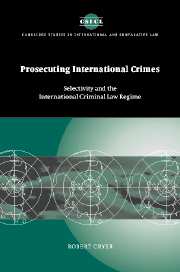Book contents
- Frontmatter
- Contents
- Preface and acknowledgements
- Table of cases
- Table of treaties
- List of abbreviations
- Introduction
- Part I The development of the international criminal law regime
- Part II Evaluating the regime
- 4 Selectivity in international criminal law
- 5 Selectivity and the law: I – definitions of crimes
- 6 Selectivity and the law: II – general principles of liability and defences
- Conclusion
- Select bibliography
- Index
- CAMBRIDGE STUDIES IN INTERNATIONAL AND COMPARATIVE LAW
4 - Selectivity in international criminal law
Published online by Cambridge University Press: 06 July 2009
- Frontmatter
- Contents
- Preface and acknowledgements
- Table of cases
- Table of treaties
- List of abbreviations
- Introduction
- Part I The development of the international criminal law regime
- Part II Evaluating the regime
- 4 Selectivity in international criminal law
- 5 Selectivity and the law: I – definitions of crimes
- 6 Selectivity and the law: II – general principles of liability and defences
- Conclusion
- Select bibliography
- Index
- CAMBRIDGE STUDIES IN INTERNATIONAL AND COMPARATIVE LAW
Summary
Since we have discussed the emergence of a regime of international criminal law enforcement, it is now time to appraise it. There are various ways in which the regime may be evaluated. It is possible, for example, to approach the regime from the point of view of its ability to protect the human rights of defendants. Although a fruitful line of enquiry, this is not the framework adopted in this book. The method adopted here will be one derived from the rule of law. This seems particularly suited for investigating a legal regime, in that the rule of law is ‘an important virtue which legal systems should possess’.
What selective enforcement involves
Timothy McCormack rightly notes that ‘there is a dual selectivity on the part of the international community. This selectivity is first found in relation to the acts the international community is prepared to characterise as “war crimes” and secondly, in relation to the particular alleged atrocities the international community is prepared to collectively prosecute.’ Chapters 5 and 6 will deal with issues related to the former critique. This chapter deals with the second part of McCormack's critique, selectivity ratione personae, although discussion will not be limited solely to collective efforts at prosecution.
Kenneth Kulp Davis helpfully explains what selectivity means: ‘when an enforcement agency or officer has discretionary power to do nothing about a case in which enforcement would be clearly justified, the result is a power of selective enforcement.
- Type
- Chapter
- Information
- Prosecuting International CrimesSelectivity and the International Criminal Law Regime, pp. 191 - 231Publisher: Cambridge University PressPrint publication year: 2005
- 1
- Cited by



